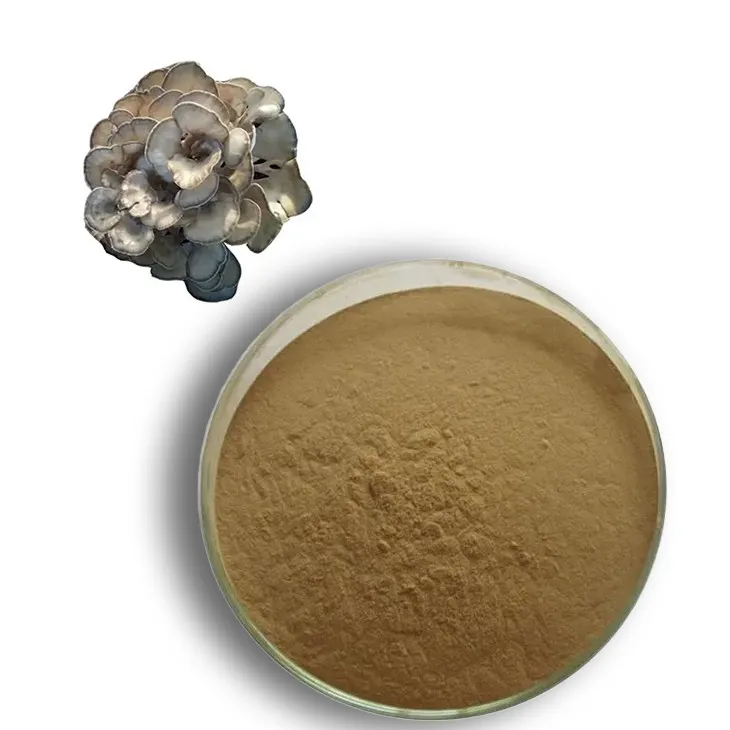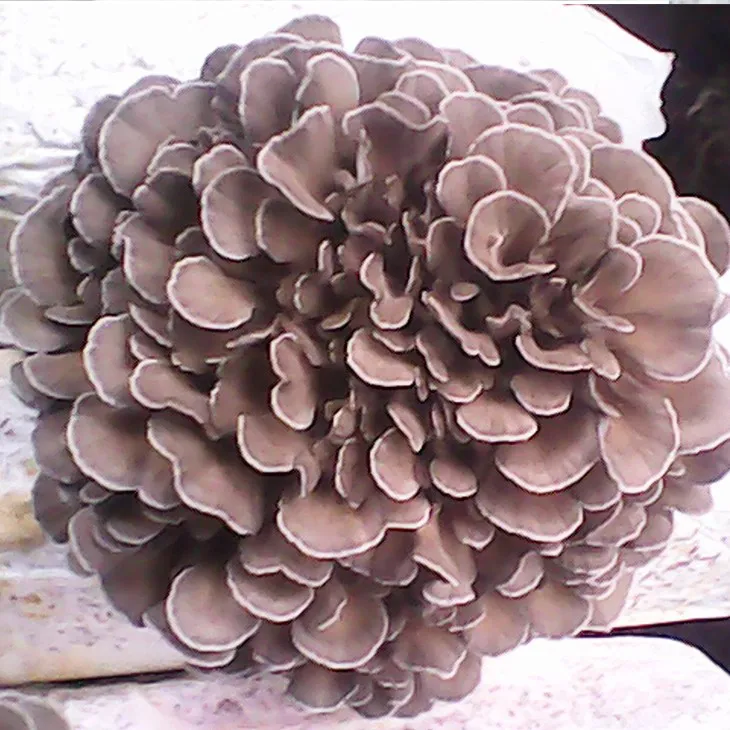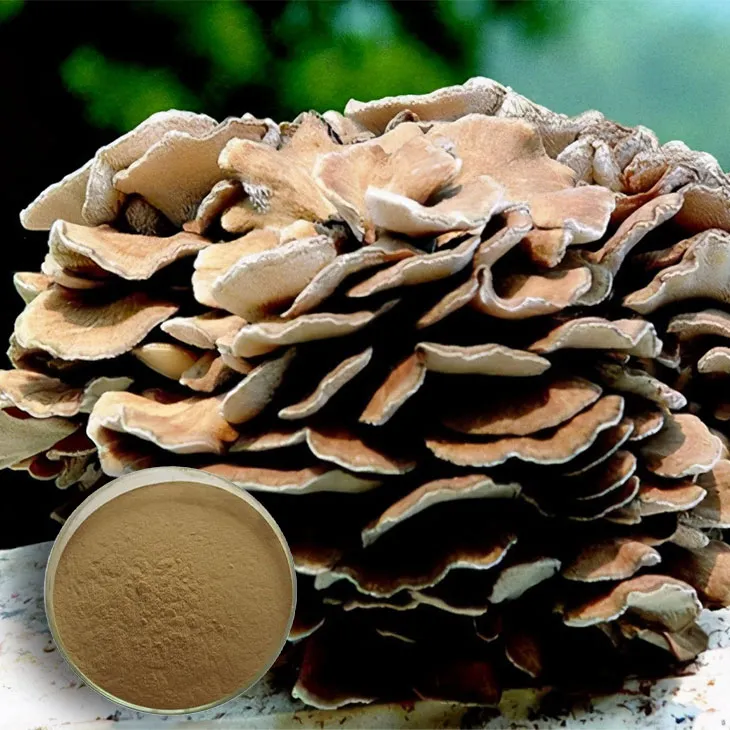- 0086-571-85302990
- sales@greenskybio.com
Maitake Mushroom Extract: Nature's Best - Kept Secret.
2024-11-12

Introduction to Maitake Mushroom
The maitake mushroom, scientifically known as Grifola frondosa, is a remarkable fungus that has been used for centuries in various cultures for its medicinal properties. This large, multi - branched mushroom is often found at the base of oak trees in temperate regions. Its unique appearance, resembling a cluster of ruffled feathers or a dancing girl's skirt, gives it the name "maitake," which means "dancing mushroom" in Japanese.

Rich in Nutrients and Bioactive Compounds
The Maitake Mushroom Extract is a concentrated source of numerous nutrients and bioactive compounds. It contains polysaccharides, such as beta - glucans, which are known for their immune - enhancing effects. These polysaccharides can stimulate the immune system by activating various immune cells, including macrophages and natural killer cells.
It also contains a variety of minerals like potassium, calcium, and magnesium, which are essential for maintaining proper physiological functions in the body. Additionally, maitake extract is a source of amino acids, the building blocks of proteins, which play crucial roles in processes such as tissue repair and enzyme production.

Immune - Boosting Properties
Activation of the Immune System: One of the most well - known benefits of Maitake Mushroom Extract is its ability to boost the immune system. The beta - glucans in maitake extract bind to specific receptors on immune cells, triggering a cascade of immune responses. This includes increased production of cytokines, which are signaling molecules that help regulate the immune response. Macrophages, for example, are activated to engulf and destroy foreign pathogens more effectively.
Enhanced Resistance to Infections: By strengthening the immune system, maitake extract can help the body better resist infections. It can be particularly beneficial during cold and flu seasons or in environments where there is a high risk of exposure to infectious agents. Regular consumption of maitake extract may reduce the frequency and severity of common infections.

Potential in Disease Prevention and Treatment
Cancer
Research has suggested that maitake extract may have potential anti - cancer properties. The polysaccharides in maitake may help modulate the immune system to recognize and target cancer cells. In some in - vitro and in - vivo studies, maitake extract has been shown to inhibit the growth of cancer cells, although more research is needed to fully understand its mechanisms and effectiveness in human cancer treatment.
Diabetes
There is evidence to indicate that maitake extract may play a role in diabetes management. It may help regulate blood sugar levels by improving insulin sensitivity. Maitake extract may also affect carbohydrate metabolism in the body, potentially reducing the risk of developing type 2 diabetes or helping to control blood sugar in those already diagnosed.
Heart Disease
Maitake extract could contribute to heart health. The mushroom's fiber content may help lower cholesterol levels by binding to bile acids in the intestine and promoting their excretion. Additionally, its antioxidant properties may protect the heart from oxidative stress, which is associated with the development of heart disease.
Traditional Use in Different Cultures
Japanese Traditional Medicine: In Japan, maitake has been used in traditional medicine for centuries. It was often consumed as a food or made into a decoction to treat various ailments, including fatigue, weakness, and digestive problems. Japanese herbalists recognized its potential to strengthen the body and promote overall well - being.
Chinese Traditional Medicine: In Chinese traditional medicine, maitake was also valued for its medicinal properties. It was believed to have a balancing effect on the body's energy, or "Qi." It was used in formulas to treat conditions related to immune deficiency and was considered a tonic for the spleen and stomach.
Modern Scientific Research on Maitake Extract
Modern science has been actively exploring the properties of maitake extract. Researchers are using advanced techniques to isolate and study the bioactive compounds in maitake. For example, they are investigating the molecular mechanisms by which the polysaccharides interact with the immune system.
Clinical trials are being conducted to evaluate the efficacy of maitake extract in treating various diseases. These trials are crucial for providing evidence - based information on its potential benefits and for determining the appropriate dosages and treatment regimens.
How to Incorporate Maitake Extract into Your Diet
Supplements: One of the easiest ways to consume maitake extract is through dietary supplements. These are available in various forms, such as capsules, tablets, and powders. When choosing a supplement, it is important to look for a high - quality product from a reputable manufacturer.
Cooking with Maitake Mushrooms: Another option is to cook with maitake mushrooms. They can be sautéed, roasted, or added to soups and stews. While cooking, the mushrooms release their flavors and nutrients, allowing you to enjoy their health benefits in a delicious way.
Conclusion
Maitake Mushroom Extract is truly a nature - given treasure with a wide range of potential health benefits. From its immune - boosting properties to its possible role in preventing and treating diseases, it has captured the attention of both traditional medicine practitioners and modern scientists. As research continues to unfold, we can expect to learn more about this amazing extract and how it can be best utilized to improve human health and well - being.
FAQ:
What is maitake extract?
Maitake extract is a substance derived from the maitake mushroom. It contains a variety of bioactive components that are believed to have numerous health - enhancing properties.
How does maitake extract boost the immune system?
Maitake extract contains certain polysaccharides and other compounds that can stimulate the activity of immune cells such as macrophages, lymphocytes etc. These immune cells play crucial roles in the body's defense against pathogens, thus helping to boost the overall immune system.
What diseases might maitake extract help combat?
There is some evidence to suggest that maitake extract may have potential in helping to combat certain diseases. For example, it may play a role in cancer prevention or support in cancer treatment by enhancing the body's immune response against cancer cells. It may also be beneficial in managing diabetes by helping to regulate blood sugar levels, though more research is still needed.
What is the significance of maitake extract in traditional medicine?
In various traditional medicine systems, maitake has been used for centuries. In some Asian cultures, it has been used to promote general health, increase vitality, and treat various ailments. For example, it was often used as a tonic to strengthen the body and improve overall well - being.
How is modern science exploring the potential of maitake extract?
Modern science is using advanced research techniques such as cell culture studies, animal models, and some human clinical trials. Scientists are analyzing the chemical composition of maitake extract to identify the active compounds. They are also studying how these compounds interact with the human body at the molecular level to better understand its potential health benefits.
Related literature
- The Bioactive Compounds of Maitake Mushroom: A Review of Their Health - Promoting Properties"
- "Maitake Mushroom Extract in Immunomodulation: Current Research and Future Perspectives"
- "Traditional and Modern Views on Maitake Mushroom in Disease Management"
- ▶ Hesperidin
- ▶ Citrus Bioflavonoids
- ▶ Plant Extract
- ▶ lycopene
- ▶ Diosmin
- ▶ Grape seed extract
- ▶ Sea buckthorn Juice Powder
- ▶ Fruit Juice Powder
- ▶ Hops Extract
- ▶ Artichoke Extract
- ▶ Mushroom extract
- ▶ Astaxanthin
- ▶ Green Tea Extract
- ▶ Curcumin
- ▶ Horse Chestnut Extract
- ▶ Other Product
- ▶ Boswellia Serrata Extract
- ▶ Resveratrol
- ▶ Marigold Extract
- ▶ Grape Leaf Extract
- ▶ New Product
- ▶ Aminolevulinic acid
- ▶ Cranberry Extract
- ▶ Red Yeast Rice
- ▶ Red Wine Extract
-
Wheat Germ Extract
2024-11-12
-
Fenugreek Extract Powder
2024-11-12
-
Eucommia Ulmoides Extract
2024-11-12
-
Selenium yeast
2024-11-12
-
Hops Extract
2024-11-12
-
Alfalfa Meal
2024-11-12
-
Hedyotis Diffusa Extract
2024-11-12
-
Thunder God Vine Extract
2024-11-12
-
Konjac Powder
2024-11-12
-
Camu Camu Extract
2024-11-12





















